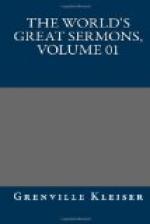If it is insufficient for the operations of God, then we fall into a more absurd blasphemy, since we condemn God for not being able, on account of the want of matter, to finish His own works. The resourcelessness of human nature has deceived these reasoners. Each of our crafts is exercised upon some special matter—the art of the smith upon iron, that of the carpenter on wood. In all there is the subject, the form and the work which results from the form. Matter is taken from without—art gives the form—and the work is composed at the same time of form and of matter.
Such is the idea that they make for themselves of the divine work. The form of the world is due to the wisdom of the supreme Artificer; matter came to the Creator from without; and thus the world results from a double origin. It has received from outside its matter and its essence, and from God its form and figure. They thus come to deny that the mighty God has presided at the formation of the universe, and pretend that he has only brought a crowning contribution to a common work; that he has only contributed some small portion to the genesis of beings; they are incapable, from the debasement of their reasonings, of raising their glances to the height of truth. Here, below, arts are subsequent to matter—introduced into life by the indispensable need of them. Wool existed before weaving made it supply one of nature’s imperfections. Wood existed before carpentering took possession of it, and transformed it each day to supply new wants and made us see all the advantages derived from it, giving the oar to the sailor, the winnowing-fan to the laborer, the lance to the soldier.
But God, before all those things which now attract our notice existed, after casting about in His mind and determining to bring into being that which had no being, imagined the world such as it ought to be, and created matter in harmony with the form which He wished to give it. He assigned to the heavens the nature adapted for the heavens, and gave to the earth an essence in accordance with its form. He formed, as he wished, fire, air, and water, and gave to each the essence which the object of its existence required.
Finally he welded all the diverse parts of the universe by links of indissoluble attachment and established between them so perfect a fellowship and harmony that the most distant, in spite of their distance, appeared united in one universal sympathy. Let those men, therefore, renounce their fabulous imaginations, who in spite of the weakness of their argument, pretend to measure a power as incomprehensible to man’s reason as it is unutterable by man’s voice.
God created the heavens and the earth, but not only one-half of each; He created all the heavens and all the earth, creating the essence with the form. For He is not an inventor of figures, but the Creator even of the essence of beings. Further, let them tell us how the efficient power of God could deal with the passive nature of matter, the latter furnishing the matter without form, the former possessing the science of the form without matter, both being in need of each other; the Creator in order to display his art, matter in order to cease to be without form and to receive a form. But let us stop here and return to our subject.




